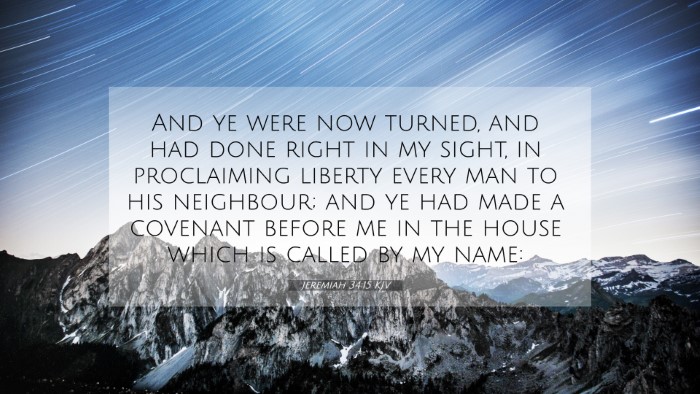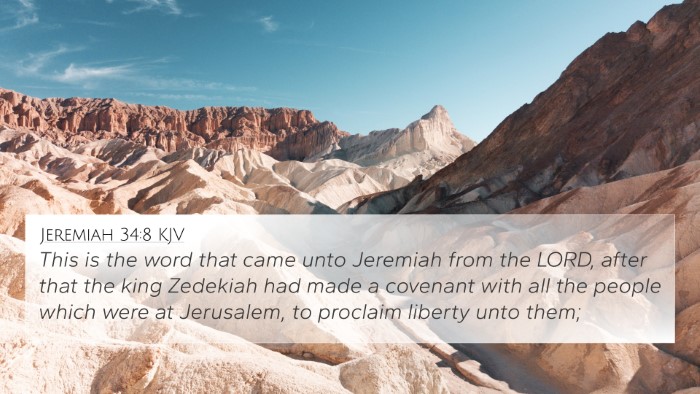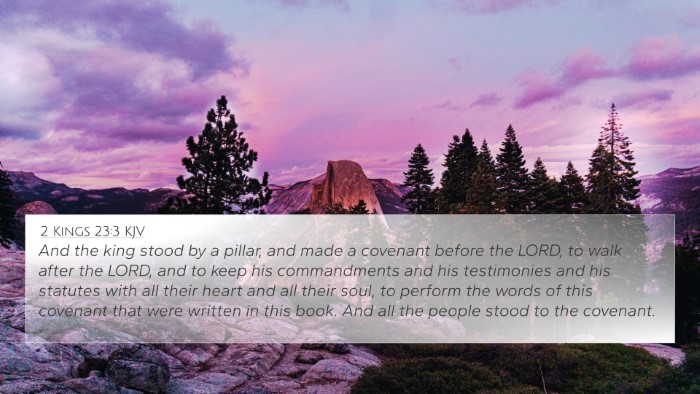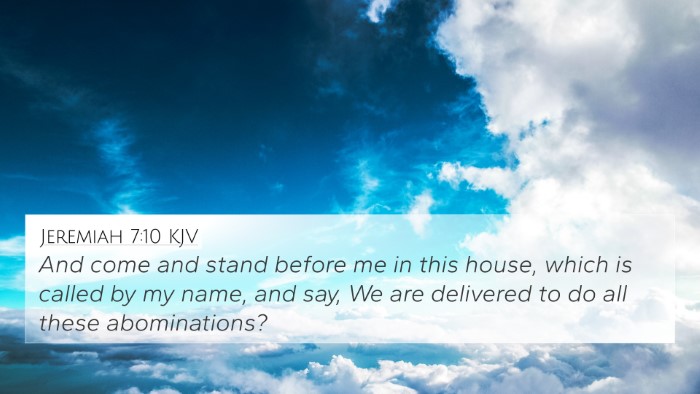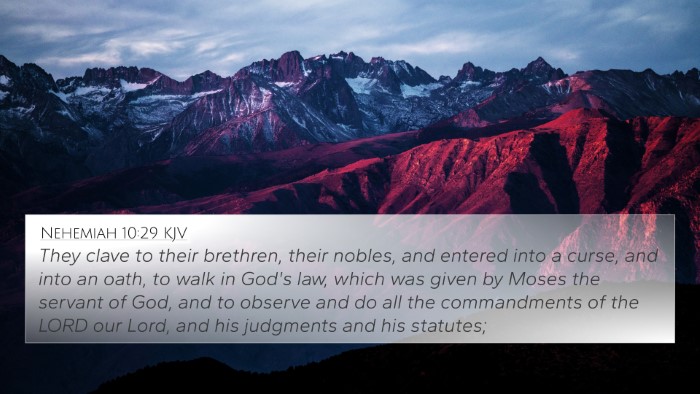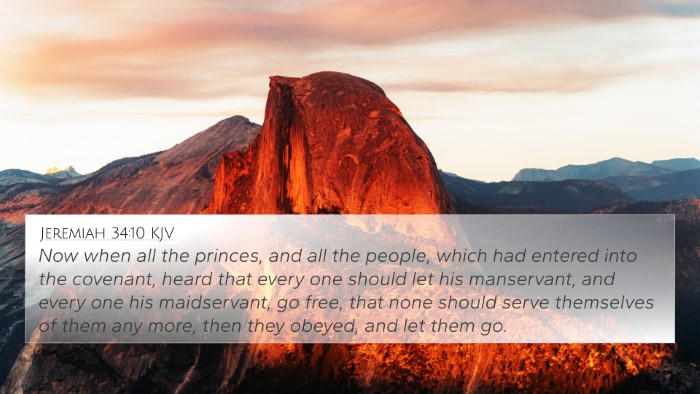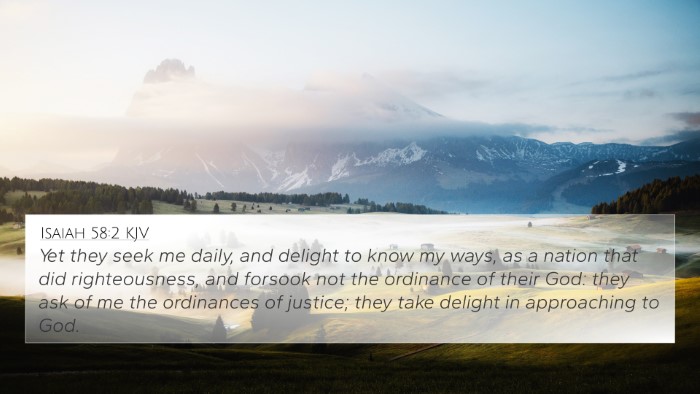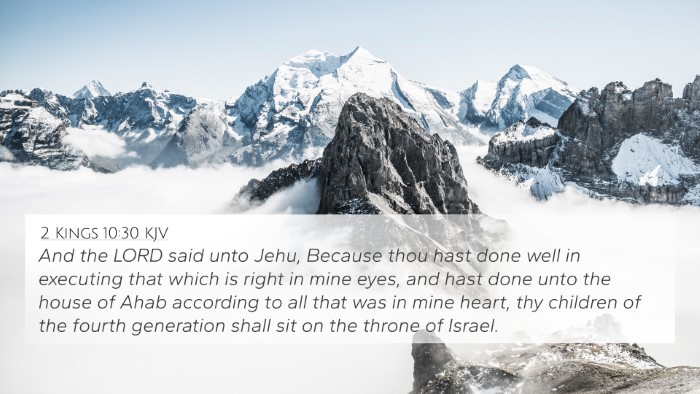Understanding Jeremiah 34:15
The verse Jeremiah 34:15 states, "And you were now turned, and had done right in my sight, in proclaiming liberty every man to his neighbor; and you had made a covenant before me in the house which is called by my name." This verse emphasizes the significance of righteousness and liberty within the context of God’s covenant with His people.
Summary of Insights
Commentaries on this verse help to illuminate its meanings:
- Matthew Henry: Henry discusses the theme of divine expectations regarding liberty and moral responsibilities. He notes that the actions of the people in proclaiming liberty were commendable, yet their failure to maintain this commitment demonstrated human inconsistency and disobedience to God's covenant.
- Albert Barnes: Barnes emphasizes the promise of divine judgment intertwined with God's merciful call for repentance. He asserts that God desires His people to be free and live in integrity, highlighting the importance of social justice as an expression of faith.
- Adam Clarke: Clarke focuses on the implications of making and breaking covenants. He points out that God expects fidelity from His people, and the call for liberty signifies a deeper moral obligation to treat one another with justice and mercy.
Thematic Connections
This verse is ripe with connections to other biblical texts that echo its themes of liberty, justice, and covenant fidelity. Below are key connections:
- Exodus 21:2: Talks about the liberation of slaves after six years of service, echoing the theme of freedom.
- Leviticus 25:10: Declares the Year of Jubilee, a celebration of freedom and restoration, reinforcing the idea of liberty.
- Ezekiel 34:27: Mentions the restoration of peace and the blessing of God's people, emphasizing justice.
- Luke 4:18: Quotes Isaiah and emphasizes Jesus’ mission to proclaim liberty to the captives, connecting the Old Testament to New Testament themes.
- Galatians 5:1: Urges believers to stand firm in their freedom in Christ, resonating with the liberation proclaimed in Jeremiah.
- James 2:13: Speaks to the importance of mercy and justice within the context of faith, paralleling the moral obligations in Jeremiah 34:15.
- Matthew 5:37: Discusses the importance of honesty and keeping one's word, reflecting the covenant nature emphasized in Jeremiah.
Interpretative Themes
In order to fully understand Jeremiah 34:15, it’s crucial to look at its broader interpretative themes:
- Covenant Relationships: The emphasis on making a covenant highlights the relational aspect between God and His people, where faithfulness is expected in all dealings.
- Social Justice: The call for liberty is a reminder of the need for justice in interpersonal relationships, representing God's heart for the marginalized.
- Human Inconsistency: Reflecting on the tendency of people to stray from commitments, this verse serves as a caution against forgetting one’s vows to God and to one another.
Bible Verse Cross-References
Understanding how Jeremiah 34:15 connects with other scriptures provides a deeper insight into its significance:
- Exodus 23:11: Discusses the provision for the poor and the earth’s rest, highlighting divine justice.
- Isaiah 58:6: Advocates for the breaking of yokes and oppression, resonating with the call for liberty.
- Romans 8:21: Speaks of creation’s longing for liberation, linking New Testament hopes to Old Testament themes.
- 2 Corinthians 3:17: Declares that where the Spirit of the Lord is, there is freedom, adding a spiritual dimension to the idea of liberty.
Conclusion
Jeremiah 34:15 is a poignant reminder of the covenant responsibilities that come with faith. By examining this verse through the lenses of various commentaries and its inter-biblical connections, one gains rich insights into God’s desires for liberty, justice, and faithfulness in all relationships.
Further Study Suggestions
For those interested in deeper study, consider using:
- Bible Concordance: To find themes related to freedom throughout Scripture.
- Bible Cross-Reference Guide: To explore interconnections among biblical themes.
- Cross-reference Bible Study: To facilitate deeper understanding during personal or group Bible study.
- Tools for Bible Cross-referencing: To aid in discovering thematic connections across the biblical narrative.


